New Teachers Bring New Bible Curriculum
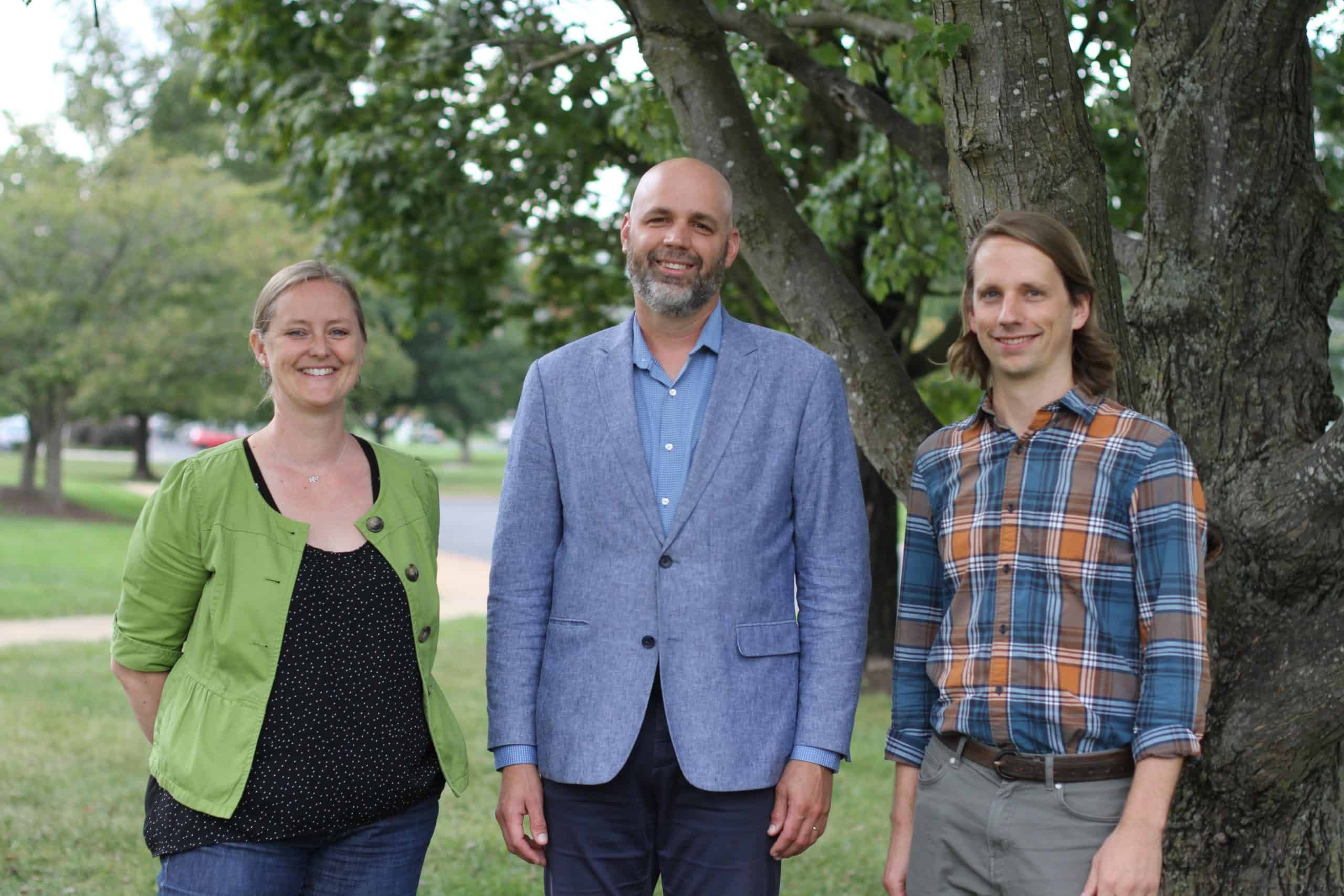
Three new high school teachers — Benjamin Bixler, Nathan Hershberger, and Karen Suderman — revised the Bible curriculum for grades 9-12 over the summer of 2022. They drew from the Encounter Curriculum created by Mennonite Schools Council, which is used by EMS in grades K-12, and built on the foundation of Anabaptist-centered Bible teaching at EMS since the school’s founding in 1917.
“Our objectives are to meet students where they are in their own faith development, to help them think deeply about who they are and how they understand the world, to present an Anabaptist Christian understanding of Jesus, and to affirm that they are loved by God for who they are,” summarized Bixler.
The Teachers
Benjamin Bixler studied English Education and Biblical Studies at Eastern Mennonite University, earned an MAR from Eastern Mennonite Seminary, and is a PhD student in Bible and Cultures at Drew Theological School. He teaches Creation and Promise, an Old Testament class required for 9th grade students; the Kingdom Living requirement for seniors each spring; and a new elective course titled Second Temple Judaism.
Nathan Hersbherger ‘08, studied history, philosophy and theology at Eastern Mennonite University, earned a master’s degree in religious studies from the University of Virginia, and a PhD in Christian Theological Studies from Duke University in 2022. He and his wife Kaitlin Heatwole served with Mennonite Central Committee in Iraq for three years, an experience he brings to his Global Christianity class, required for 11th grade students.
Karen Suderman, originally from Didsbury, Alberta, earned a bachelor’s degree from Canadian Mennonite University in literature and a master’s degree from the University of Western Ontario in library science. She and her family lived in South Africa for seven years, serving with Mennonite Church Canada Witness. She teaches Jesus Story, a requirement for 10th grade students, and Kingdom Living for high school seniors.
The Program
“The Bible department occupies an interesting intersection within the bigger picture of an EMS education,” Bixler reflects. “Bible class outcomes are the responsibility of Bible teachers, but the entire faculty and staff are key to implementing the school’s Faith Practices.”
Bible teachers facilitate study of the Bible and learning about church history, ethics, theology, religion, and more, the teachers note. They also have a unique challenge of making space for a variety of theological perspectives and helping students of other faiths or no faith tradition to feel at home in EMS Bible classes.
As they designed curriculum, the teachers turned to the EMS vision statement and asked themselves: How does “every student belong, thrive, and live God’s call” in our Bible classes?
“We seek to create spaces and curricula that strive for truth seeking,” Suderman shared with colleagues at the beginning of the year. “We root the pursuit in the Bible, and aim to make materials and discussions relevant, and responsive to student needs and interests… We hope to help students to identify and exercise their gifts, engage their beliefs and faith in all aspects of their lives, and grow compassionate ears to have difficult conversations.”
One visible change has been to the senior presentation, a culminating activity for the Kingdom Living course. The assignment invites seniors to reflect on:
- where have they come from and what communities have shaped them;
- who are they now and what they believe;
- and what type of person they hope to be in the future.
In addition, each student is invited to choose a guiding metaphor for their presentation, identifying a few significant experiences or aspects of their lives and reflecting deeply on them.
“I wish every teacher, parent, and stakeholder could see what I see when I walk into our Bible classes,” says Justin King, high school principal. “I sometimes feel like I need to take my shoes off because I feel like I am in a sacred space.”
EMS Bible teachers “commit to deep listening and engage in biblical discernment,” says King. “When we engage in meaningful discussions around faith, make space for questions, and root our ‘why’ in a commitment to following Jesus, our goal is that our students, and all at EMS, aspire to reflect Christ’s light.”
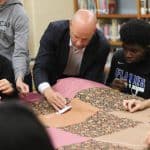
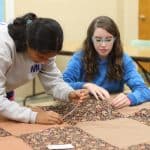

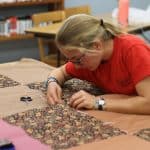
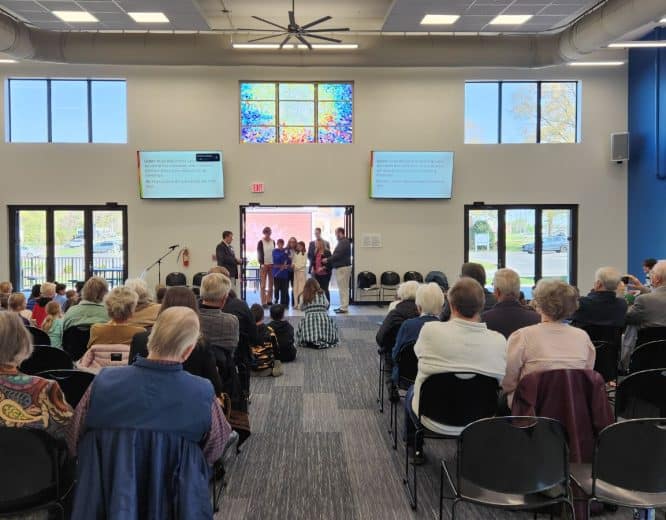
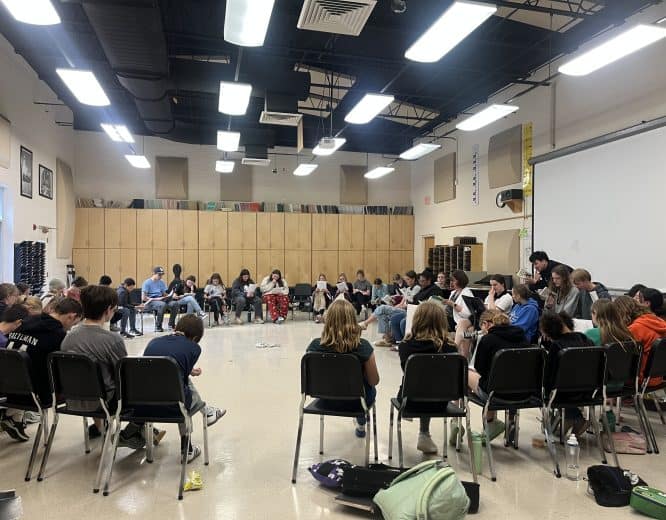

¿Christian Family Living es una materia optativa que pueden tomar los estudiantes de tercer y cuarto año? Se ha enseñado en EM(H)S desde la década de 1970, primero por Harvey Yoder, luego por mí, luego en equipo por Curt Stutzman y yo, y luego por Curt solo. Parece una clase imprescindible para aprender sobre desarrollo personal, elegir una pareja de vida con valores sólidos y aprender sobre sexualidad en un contexto saludable.
Quizás se abandonó porque Curt dejó EMS.
Gran pregunta Gloria. Gracias por preguntar. La clase, impartida por Curt Stutzman durante muchos años y otros antes, fue una piedra angular de la formación en la fe en EMS. Todavía estamos en el proceso de determinar todas las materias optativas bíblicas que se ofrecerán mientras imaginamos un alcance y secuencia desde K-12 para el departamento de Biblia y para la formación general de la fe en EMS. “Adultos 101” es una nueva asignatura optativa de esta primavera, impartida por Jesse Blosser, que abordará algunos de los conceptos de CFL, como presupuestos e incluso relaciones saludables y valores personales. Todavía se están preparando asignaturas optativas adicionales.